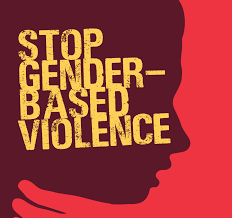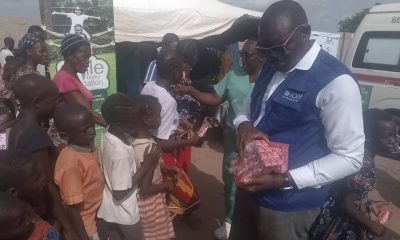Health
NGO Tasks Edo Women in Leadership on Mitigating GBV

An NGO, Global Women for Quality and Sustainable Development Initiative (GWSD) has urged women in leadership positions in Edo to use their various offices to mitigate gender-based violence (GBV) in the society.
Executive Director of GWSD, Mrs Mariam Kadiri-Ezolome, stated this during a capacity building on stimulating women for leadership positions, held in Benin yesterday.
The training was aimed at mitigating GBV through protection.
Kadiri-Ezolome said that GBV would be alleviated in the society, if more women were empowered and speak out against it.
“As women leaders, you should relate more with women at the grassroots; know what they are going through and see that they are empowered to bridge the gender gaps in the society.
“Women leaders should give other women, especially at community level, the voice to speak out against GBV.
“Also, some women don’t know what GBV is and as women in leadership, it is expected that we create awareness about it,” she said.
Speaking on violence against women during elections, the Founder, Echoes of Women in Africa, Mrs Louisa Eikhomun-Agbonkhese, said that electoral violence were mostly targeted at women and girls, thus preventing them from exercising their franchise.
Eikhomun-Agbonkhese added that women were sometimes scared to speak out against GBV in the political space due to fear of the leadership structure.
In her remarks, Executive Director, Women, Youths and Children Advancement Programme, Mrs Agatha Osieke, said that women should equip themselves with relevant skills to enable them rise above GBV.
“You should know what you are seeking for: that you want to bring positive change. You need relevant skills, research, negotiation, listening and more.
“Women need to come up with a roadmap to change the narrative that women are not ready to hold political positions,” she said.
NAN reports that GWSD is a non-profit organisation dealing with issues concerning women, youths and people in the community.
The group also provides varied services, geared toward improving the quality of life of its beneficiaries for sustainable development.
NAN also reports that the capacity building was organised by GWSD and funded by European Union, in partnership with Agent for Citizens Driven Transformation, through the British Council. (NAN)
Health
Soludo’s Wife Establishes Pad Banks in 300 schools

Wife of Anambra State Governor, Dr Nonye Soludo, says she has established pad banks in 300 schools across the state as part of her pet project, Healthy Living Initiative.
Mrs Soludo disclosed this in a message in Awka on Wednesday to mark the 2025 World Menstrual Hygiene Day.
She said that the initiative was her own approach to helping school girls whose academic focus could be affected during menstruation and related emergencies.
Mrs Soludo stressed the need to provide immediate solutions for menstrual emergencies in schools, so that girls caught off guard could confidently rely on the pad banks.
“Official data say that an estimated 37 million women and girls in Nigeria are unable to afford sanitary pads and only rely on unhygienic alternatives.
“The data reinforce World Health Organisation and United Nations Children’s Fund finding that poor water, sanitation and hygiene infrastructure hinders safe and dignified menstruation for women and girls.
“Other data say that only two in five schools globally offer menstrual health education and just one in three have bins for menstrual waste.
“These figures challenge key stakeholders to find practical solutions to address the root of the problem while the situation remains reversible.”
She called for intensified campaign to reach more women and girls currently facing menstrual hygiene challenges.
The governor’s wife noted that the growing number of women, especially girls, in urgent need of menstrual support makes it essential for stakeholders to re-strategise their campaign approach.
According to her, menstrual health remains the right of every girl-child.
She encouraged girls at the designated schools participating in the pad bank project to use the supplies with confidence.
Mrs Soludo assured them that her NGO was fully committed to restocking any of the pad banks that run out of sanitary products.(NAN)
General News
More Recognitions, Honor for Ogbodo, Receives Peace Ambassador, Ministerial Award for Outstanding Service

By David Torough, Abuja
Medical Director of Lydia Memorial Hospital in Okpokwu, Benue State, Dr. Mark Ogbodo has once again been honored for his exceptional service to humanity.
This time receiving the prestigious title of Peace Ambassador and a Ministerial Award for the Most Dedicated, Committed and Hardworking Hospital in Benue State.
The honours were bestowed by the National Association of Nigerian Youths Ambassadors for Peace Initiative (NANYAPI) in recognition of Dr.
Ogbodo’s bravery, dedication, and unwavering commitment to medical service delivery in Okpokwu Local Government Area, Benue State, and Nigeria at large.Presenting the award, the President of NANYAPI, Comrade Aji Abraham, described Dr.
Ogbodo as a role model whose leadership and selfless service have distinguished him as a beacon of peace and a symbol of hope. He commended Dr. Ogbodo’s outstanding managerial skills and humanitarian spirit, which he said inspired the association to honour him.The event, held at Lydia Memorial Hospital, drew friends, well-wishers, and dignitaries from various sectors. In a welcome address on behalf of the hospital’s management and staff, Miss Victory Oche expressed heartfelt appreciation for the presence of the association’s leadership and delegates, as well as supporters of Dr. Ogbodo.
“May our purpose of gathering here today, which is to celebrate and honour our mentor and leader, Dr. Mark A. C. Ogbodo, for his unwavering and relentless contributions to humanity and nation building, be fruitful,” she said.
In his acceptance speech, Dr. Ogbodo expressed profound gratitude for the recognition, stating that the award had deeply touched him and would further motivate his advocacy for peace and service to humanity.
“I am deeply humbled and honoured to receive this award,” he said. “It means a lot to me as it acknowledges contributions I never knew were being noticed. This recognition will further spur me to continue promoting peace, unity, and development.”
He urged fellow peace ambassadors to embody the values of integrity, neutrality, and positive engagement. “Tarnish no image. Blackmail no opponent. Build bridges across tribes, cultures, and political divides. Serve as true ambassadors of peace,” he urged.
Dr. Ogbodo pledged continued support for NANYAPI and reaffirmed his commitment to peacebuilding efforts across Nigeria.
The ceremony also featured goodwill messages from traditional leaders, security officers, youth leaders, and the hospital staff, including HRH Chief Mark Barron Onah, Ward Head of Akpodo Community; SP Okoliko, DPO of Ugbokolo Division; Hon. Andrew Ameh, Youth Leader of Amejo Ward; Inspector Ogbaka of Ugbokolo Police Division; and staff of Lydia Memorial Hospital.
Health
We want Nigeria Where No Child Is Exploited, Excluded – Children’s Parliament

National Children’s Parliament has urged stakeholders to build a Nigeria where no child faces violence, forced labour or exclusion.
The Speaker of the parliament, Progress Umoh, made the call at the 2025 National Children’s Day in Abuja on Tuesday.
Umoh said that children craved for a country where every child has the tool to learn, dream and grow to full potential.
She pointed out that many children face violence, fear and exclusion in spaces meant to nurture them, adding that children demand more than promises.
“We demand protection. As Nelson Mandela said — a society’s soul is measured by how it treats its children.
“Let us honour that truth with action.
“As the speaker of the National Children’s Parliament, I stand before you not just as a young Nigerian but as a voice for millions of children whose rights and future depend on meaningful action.”
She said that the Children’s Parliament serves as vital platform where young voices unite to address critical issues, propose solutions and drive change.
According to her, children deserve a seat at the table in shaping policies that affect them.
She noted that the theme of the global observance — “Stand Up, Speak Up: Building a Bullying-Free Generation”, is an urgent call to action.
She, therefore, called for full implementation of the National Policy on Safe Schools to ensure every child learns in a safe environment without fear.
The speaker also stressed the need to strengthen child rights advocacy clubs in rural and underserved areas.
This, according to her, will empower young leaders to speak up.
She explained that “while initiatives like the National Commission for Almajiri Education are commendable, we need bolder steps to rescue out-of-school children, providing them education, safety and skills for the future.
“Programmes like the Girl-Led Movement proves that when children lead, change happens, such
initiatives must include all children, ensuring their voices shape decisions about their lives.”
Responding, President Bola Tinubu reaffirmed his administration’s commitment to protecting the rights, dreams and future of every Nigerian child.
Represented by the Minister of the Federal Capital Territory, Mr Nyesom Wike, the president described children as “the precious part of the nation’s fabric.”
Wike was also represented at the event by the FCT Minister of State, Dr Mariya Mahmoud.
Tinubu added that children are also the heartbeat of Nigeria’s future and custodians of tomorrow’s promise, innovation and leadership.
He said “I, therefore, reaffirm today, our constitutional, moral and intergenerational duty and commitment to safeguard every Nigerian child, protect their rights and nurture their dreams.”
Similarly, the Minister of Women Affairs, Imaan Sulaiman-Ibrahim, said children’s day serves as an opportunity to reaffirm commitment to uphold the rights of every child to survive, thrive and fulfil their potential.
Sulaiman-Ibrahim added that the day also presents an opportunity to reflect and renew commitment to the rights, protection and wellbeing of every Nigerian child.
She said the Federal Government would strengthen the Nigeria Children’s Parliament to institutionalise child participation in governance.
“We are also developing the institutional framework for a National Child Protection and Development Agency.
“This strategic action aligned with the ministry’s Five-Year Strategic Roadmap to ensure accountability, coordination and sustainability in child welfare programming.”
On her part, Dr Adedayo Benjamins-Laniyi, the Pioneer Mandate Secretary, FCT Women Affairs, said “we are here to recognise the significance of our children in the family circle and the society at large.
“Importantly, we are here to stress the obvious fact that our children are great asset to us, they represent our hope, our continuity, our vision and most importantly, the future of our dear country, Nigeria.
“Today, as we gather to celebrate our children, we call on our teeming students in FCT to rise against bullying and speak up whenever confronted with this radical menace.
“I urge you to avoid bullying and channel all your energy to academic resourcefulness to shape a better tomorrow for yourselves,”(NAN)

























